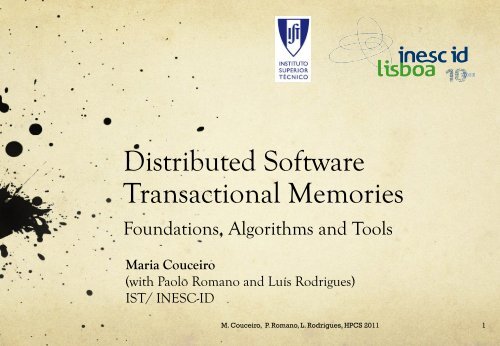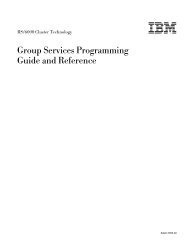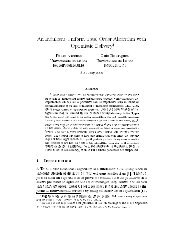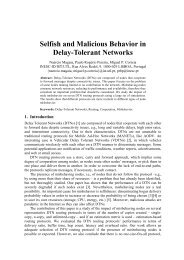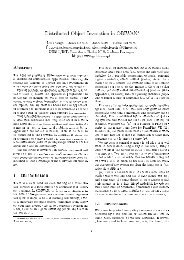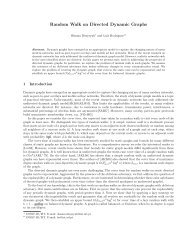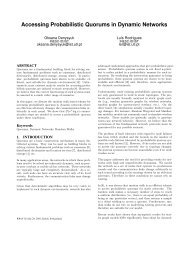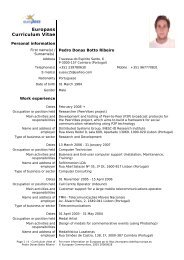Distributed Software Transactional Memories - Distributed Systems ...
Distributed Software Transactional Memories - Distributed Systems ...
Distributed Software Transactional Memories - Distributed Systems ...
Create successful ePaper yourself
Turn your PDF publications into a flip-book with our unique Google optimized e-Paper software.
<strong>Distributed</strong> <strong>Software</strong><br />
<strong>Transactional</strong> <strong>Memories</strong><br />
Foundations, Algorithms and Tools<br />
Maria Couceiro<br />
(with Paolo Romano and Luís Rodrigues)<br />
IST/ INESC-ID<br />
M. Couceiro, P. Romano, L. Rodrigues, HPCS 2011 1
Contents<br />
! Part I: (Non-<strong>Distributed</strong>) STMs<br />
! Part II: <strong>Distributed</strong> STMs<br />
! Part III: Case-studies<br />
! Part IV: Conclusions<br />
M. Couceiro, P. Romano, L. Rodrigues, HPCS 2011
Contents<br />
! Part I: (Non-<strong>Distributed</strong>) STMs<br />
! Part II: <strong>Distributed</strong> STMs<br />
! Part III: Case-studies<br />
! Part IV: Conclusions<br />
M. Couceiro, P. Romano, L. Rodrigues, HPCS 2011
(Non-<strong>Distributed</strong>) STMs<br />
! Basic Concepts<br />
! Example Algorithms<br />
M. Couceiro, P. Romano, L. Rodrigues, HPCS 2011
Basic Concepts<br />
! Concurrent programming has always been a challenge<br />
! One needs to control the concurrent access to shared data<br />
by multiple threads<br />
! This is hard for most programmers.<br />
! Concurrent programming has been a “niche”<br />
M. Couceiro, P. Romano, L. Rodrigues, HPCS 2011
Basic Concepts<br />
! In the past:<br />
! More performance via faster CPUs<br />
! Now:<br />
! More performance via more CPUs<br />
! Concurrent programming has to become mainstream<br />
M. Couceiro, P. Romano, L. Rodrigues, HPCS 2011
Basic Concepts<br />
! Ideally<br />
! Performance would scale linearly with the number of cores<br />
! (with 8 cores we would have a program 8 times faster)<br />
! Reality:<br />
! Speed up limited by % serial code<br />
! Small % can kill performance (Amdahl’s Law)<br />
! Say 25% of the program is serial<br />
! 8 cores = 2.9 speedup.<br />
M. Couceiro, P. Romano, L. Rodrigues, HPCS 2011
Basic Concepts<br />
! Ideally<br />
! Performance would scale linearly with the number of cores<br />
! (with 8 cores we would have a program 8 times faster)<br />
! Reality:<br />
! Small % of serial code can kill performance (Amdahl’s Law)<br />
! Say 25% of the program is serial<br />
! 32 cores = 3.7 speedup.<br />
M. Couceiro, P. Romano, L. Rodrigues, HPCS 2011
Basic Concepts<br />
! Ideally<br />
! Performance would scale linearly with the number of cores<br />
! (with 8 cores we would have a program 8 times faster)<br />
! Reality:<br />
! Small % of serial code can kill performance (Amdahl’s Law)<br />
! Say 25% of the program is serial<br />
! 128 cores = 3.9 speedup.<br />
M. Couceiro, P. Romano, L. Rodrigues, HPCS 2011
Basic Concepts<br />
! It is hard or impossible to structure a program in a set of<br />
parallel independent tasks.<br />
! We need efficient and simple mechanisms to manage<br />
concurrency.<br />
M. Couceiro, P. Romano, L. Rodrigues, HPCS 2011
Explicit synchronization<br />
! One of the most fundamental and simple synchronization<br />
primitive is the lock<br />
non-synchronized code;<br />
lock ();<br />
do stuff on shared data;<br />
unlock ();<br />
more non-synchronized code;<br />
M. Couceiro, P. Romano, L. Rodrigues, HPCS 2011
Many problems with locks<br />
! Deadlock:<br />
! locks acquired in “wrong” order.<br />
! Races:<br />
! due to forgotten locks<br />
! Error recovery tricky:<br />
! need to restore invariants and release locks in exception<br />
handlers<br />
M. Couceiro, P. Romano, L. Rodrigues, HPCS 2011
Fine Grained Parallelism?<br />
! Very complex:<br />
! Need to reason about deadlocks, livelocks, priority inversions.<br />
! Verification nightmare as bugs may be hard to reproduce.<br />
! Make parallel programming accessible to the masses!!!<br />
M. Couceiro, P. Romano, L. Rodrigues, HPCS 2011
Concurrent Programming<br />
Without Locks<br />
! Lock-free algorithms.<br />
! Hard to design and prove correct.<br />
! Only for very specialized applications.<br />
! Designed and implemented by top experts.<br />
M. Couceiro, P. Romano, L. Rodrigues, HPCS 2011
Abstractions for simplifying<br />
concurrent programming…<br />
M. Couceiro, P. Romano, L. Rodrigues, HPCS 2011
Atomic transactions<br />
atomic {<br />
access object 1;<br />
access object 2;<br />
}<br />
M. Couceiro, P. Romano, L. Rodrigues, HPCS 2011
<strong>Transactional</strong> <strong>Memories</strong><br />
! Hide away synchronization issues from the programmer.<br />
! Advantages:<br />
! avoid deadlocks, priority inversions, convoying;<br />
! simpler to reason about, verify, compose.<br />
M. Couceiro, P. Romano, L. Rodrigues, HPCS 2011
TMs: where we are, challenges, trends<br />
! Theoretical Aspects<br />
! Formalization of adequate consistency guarantees, performance<br />
bounds.<br />
! Hardware support<br />
! Very promising simulation-based results, but no support in commercial<br />
processors.<br />
M. Couceiro, P. Romano, L. Rodrigues, HPCS 2011
TMs: where we are, challenges, trends<br />
! <strong>Software</strong>-based implementations (STM)<br />
! Performance/scalability improving, but overhead still not satisfactory.<br />
! Language integration<br />
! Advanced supports (parallel nesting, conditional synchronization) are<br />
appearing...<br />
! ...but lack of standard APIs & tools hampers industrial penetration.<br />
M. Couceiro, P. Romano, L. Rodrigues, HPCS 2011
TMs: where we are, challenges, trends<br />
! Operating system support<br />
! Still in its infancy, but badly needed (conflict aware scheduling,<br />
transactional I/O).<br />
! Recent trends:<br />
! Shift towards distributed environments to enhance scalability &<br />
dependability.<br />
M. Couceiro, P. Romano, L. Rodrigues, HPCS 2011
Run-time<br />
! How does it work?<br />
! The run time implements concurrency control in an<br />
automated manner.<br />
! Two main approaches:<br />
! Pessimistic concurrency control (locking).<br />
! Optimistic concurrency control.<br />
M. Couceiro, P. Romano, L. Rodrigues, HPCS 2011
Example of pessimistic<br />
concurrency control<br />
! Each item has a read/write lock.<br />
! When an object is read, get the read lock.<br />
! Block if write lock is taken.<br />
! When an object is written, get the write lock.<br />
! Block if read or write lock is taken.<br />
! Upon commit/abort:<br />
! Release all locks.<br />
M. Couceiro, P. Romano, L. Rodrigues, HPCS 2011
Example of optimistic<br />
concurrency control<br />
! Each item has a version number.<br />
! Read items and store read version.<br />
! Write local copy of items.<br />
! Upon commit do atomically:<br />
! If all read items still have the read version (no other concurrent<br />
transaction updated the items)<br />
! then apply all writes (increasing the version number of written<br />
items).<br />
! Else,<br />
! abort.<br />
M. Couceiro, P. Romano, L. Rodrigues, HPCS 2011
Many, many, variants exist<br />
! For instance, assume that two phase locking is used and a<br />
deadlock is detected. It is possible:<br />
! Abort both transactions.<br />
! Abort the oldest transaction.<br />
! Abort the newest transaction.<br />
! Abort the transaction that did less work.<br />
M. Couceiro, P. Romano, L. Rodrigues, HPCS 2011
Many, many, variants exist<br />
! For instance, assume that two phase locking is used and a<br />
deadlock is detected. It is possible:<br />
! Abort both transactions<br />
! Abort the oldest transaction<br />
! Abort the newest transaction<br />
! Abort the transaction that did less work<br />
Each alternative offers different performance with different<br />
workloads.<br />
M. Couceiro, P. Romano, L. Rodrigues, HPCS 2011
How to choose?<br />
! What is a correct behavior?<br />
! Which safety properties should be preserved?<br />
! Which liveness properties should be preserved?<br />
M. Couceiro, P. Romano, L. Rodrigues, HPCS 2011
How to choose?<br />
! What is a correct behavior?<br />
! Which safety properties should be preserved?<br />
! Which liveness properties should be preserved?<br />
To answer these questions we need a bit of theory.<br />
M. Couceiro, P. Romano, L. Rodrigues, HPCS 2011
Theoretical Foundations<br />
! Safety:<br />
! What schedules are acceptable by an STM?<br />
! Is classic atomicity property appropriate?<br />
! Liveness:<br />
! What progress guarantees can we expect from an STM?<br />
M. Couceiro, P. Romano, L. Rodrigues, HPCS 2011
Theoretical Foundations<br />
! Safety:<br />
! What schedules are acceptable by an STM?<br />
! Is classic atomicity property appropriate?<br />
! Liveness:<br />
! What progress guarantees can we expect from an STM?<br />
M. Couceiro, P. Romano, L. Rodrigues, HPCS 2011
Classic atomicity property<br />
! A transaction is a sequence of read/write operations on<br />
variables:<br />
! sequence unknown a priori (otherwise called static<br />
transactions).<br />
! asynchronous (we do not know a priori how long it takes to<br />
execute each operation).<br />
! Every operation is expected to complete.<br />
! Every transaction is expected to abort or commit.<br />
M. Couceiro, P. Romano, L. Rodrigues, HPCS 2011
Histories<br />
! The execution of a set of transactions on a set of objects is<br />
modeled by a history<br />
! A history is a total order of operation, commit and abort<br />
events<br />
OP OP C OP OP C<br />
M. Couceiro, P. Romano, L. Rodrigues, HPCS 2011
Histories<br />
! Two transactions are sequential (in a history) if one invokes<br />
its first operation after the other one commits or aborts;<br />
they are concurrent otherwise.<br />
M. Couceiro, P. Romano, L. Rodrigues, HPCS 2011
Histories<br />
! Two transactions are sequential (in a history) if one invokes<br />
its first operation after the other one commits or aborts;<br />
they are concurrent otherwise.<br />
! Non-sequential:<br />
OP OP C OP OP C<br />
M. Couceiro, P. Romano, L. Rodrigues, HPCS 2011
Histories<br />
! Two transactions are sequential (in a history) if one invokes<br />
its first operation after the other one commits or aborts;<br />
they are concurrent otherwise.<br />
! Sequential:<br />
OP<br />
C<br />
OP<br />
OP<br />
OP<br />
C<br />
M. Couceiro, P. Romano, L. Rodrigues, HPCS 2011
Histories<br />
! A history is sequential if it has only sequential transactions;<br />
it is concurrent otherwise<br />
M. Couceiro, P. Romano, L. Rodrigues, HPCS 2011
Histories<br />
! A history is sequential if it has only sequential transactions;<br />
it is concurrent otherwise.<br />
! Sequential:<br />
OP<br />
C<br />
OP<br />
OP<br />
C<br />
OP<br />
C<br />
M. Couceiro, P. Romano, L. Rodrigues, HPCS 2011
Histories<br />
! A history is sequential if it has only sequential transactions;<br />
it is concurrent otherwise.<br />
! Non-sequential:<br />
OP<br />
C OP OP OP C C<br />
M. Couceiro, P. Romano, L. Rodrigues, HPCS 2011
Histories<br />
! Two histories are equivalent if they have the same transactions.<br />
M. Couceiro, P. Romano, L. Rodrigues, HPCS 2011
Histories<br />
! Two histories are equivalent if they have the same<br />
transactions<br />
! Equivalent:<br />
OP<br />
C<br />
OP<br />
OP<br />
C<br />
OP<br />
C<br />
OP<br />
C OP OP OP C C<br />
M. Couceiro, P. Romano, L. Rodrigues, HPCS 2011
Histories<br />
! Two histories are equivalent if they have the same<br />
transactions<br />
! Non-equivalent:<br />
OP<br />
C<br />
OP<br />
OP<br />
C<br />
OP<br />
C<br />
OP<br />
C OP OP OP C C<br />
M. Couceiro, P. Romano, L. Rodrigues, HPCS 2011
What the programmer wants?<br />
! Programmer does not want to be concerned about<br />
concurrency issues.<br />
! Execute transactions “as if” they were serial<br />
! No need to be “serially executed” as long as results are the<br />
same<br />
OP<br />
C<br />
OP<br />
OP<br />
C<br />
OP<br />
C<br />
M. Couceiro, P. Romano, L. Rodrigues, HPCS 2011
Serializability’s definition<br />
(Papa79 - View Serializability)<br />
! A history H of committed transactions is serializable if there is a<br />
history S(H) that is:<br />
! equivalent to H<br />
! sequential<br />
! every read returns the last value written<br />
M. Couceiro, P. Romano, L. Rodrigues, HPCS 2011
Serializability<br />
! Serializable?<br />
WO1(1)<br />
WO2(1) RO2(1) RO1(0) C C<br />
M. Couceiro, P. Romano, L. Rodrigues, HPCS 2011
Serializability<br />
! Serializable!<br />
WO1(1)<br />
WO2(1) RO2(1) RO1(0) C C<br />
WO2(1)<br />
RO1(0) C RO2(1) WO1(1) C<br />
M. Couceiro, P. Romano, L. Rodrigues, HPCS 2011
Serializability<br />
! Serializable?<br />
WO1(1)<br />
WO2(1) RO2(0) RO1(0) C C<br />
M. Couceiro, P. Romano, L. Rodrigues, HPCS 2011
Serializability<br />
! Non-serializable!<br />
WO1(1)<br />
WO2(1) RO2(0) RO1(0) C C<br />
RO2(0) WO1(1) C WO2(1) RO1(0) C<br />
WO2(1) RO1(0) C<br />
RO2(0)<br />
WO1(1)<br />
C<br />
M. Couceiro, P. Romano, L. Rodrigues, HPCS 2011
Opacity<br />
! Serializable (blue aborts)?<br />
WO2(1) RO2(1) RO1(0) A WO1(1) C<br />
M. Couceiro, P. Romano, L. Rodrigues, HPCS 2011
Opacity<br />
! Serializable: only committed transactions matter!<br />
WO2(1) RO2(1) RO1(0) A WO1(1) C<br />
RO2(1)<br />
WO1(1)<br />
C<br />
M. Couceiro, P. Romano, L. Rodrigues, HPCS 2011
Opacity<br />
! In a database environment, transactions run SQL:<br />
! no harm if inconsistent values are read as long as the<br />
transaction aborts.<br />
! This is not the same in a general programming language:<br />
! observing inconsistent values may crash or<br />
hang an otherwise correct program!<br />
M. Couceiro, P. Romano, L. Rodrigues, HPCS 2011
Opacity: example<br />
Initially: x:=1; y:=2<br />
- T1: x := x+1; y := y+1<br />
- T2: z:= 1 / (y-x);<br />
If T1 and T2 are atomic, the program is correct.<br />
M. Couceiro, P. Romano, L. Rodrigues, HPCS 2011
Opacity: example<br />
Initially: x:=1; y:=2<br />
- T1: x := x+1; y := y+1<br />
- T2: z:= 1 / (y-x);<br />
Otherwise...<br />
M. Couceiro, P. Romano, L. Rodrigues, HPCS 2011
Opacity: example<br />
Initially: x:=1; y:=2<br />
- T1: x := x+1; y := y+1<br />
- T2: z:= 1 / (y-x);<br />
Otherwise...<br />
M. Couceiro, P. Romano, L. Rodrigues, HPCS 2011
Opacity: example<br />
Initially: x:=1; y:=2<br />
- T1: x := x+1; y := y+1<br />
- T2: z:= 1 / (2-x);<br />
Otherwise...<br />
M. Couceiro, P. Romano, L. Rodrigues, HPCS 2011
Opacity: example<br />
Initially: x:=1; y:=2<br />
- T1: x := x+1; y := y+1<br />
- T2: z:= 1 / (2-x);<br />
Otherwise...<br />
M. Couceiro, P. Romano, L. Rodrigues, HPCS 2011
Opacity: example<br />
Initially: x:=1; y:=2<br />
After T1: x:=2; y:=3<br />
- T1: x := x+1; y := y+1<br />
- T2: z:= 1 / (2-x);<br />
Otherwise...<br />
M. Couceiro, P. Romano, L. Rodrigues, HPCS 2011
Opacity: example<br />
Initially: x:=1; y:=2<br />
After T1: x:=2; y:=3<br />
- T1: x := x+1; y := y+1<br />
- T2: z:= 1 / (2-2);<br />
Otherwise...divide by zero!<br />
M. Couceiro, P. Romano, L. Rodrigues, HPCS 2011
! Intuitive definition:<br />
Opacity<br />
[GK08]<br />
! every operation sees a consistent state<br />
(even if the transaction ends up aborting)<br />
M. Couceiro, P. Romano, L. Rodrigues, HPCS 2011
! Intuitive definition:<br />
Opacity<br />
[GK08]<br />
! every operation sees a consistent state<br />
(even if the transaction ends up aborting)<br />
! Following history is serializable but violates opacity!<br />
WO2(1) RO2(0) RO1(0) C WO1(1) A<br />
M. Couceiro, P. Romano, L. Rodrigues, HPCS 2011
Does classic optimistic concurrency<br />
control guarantee opacity?<br />
! Writes are buffered to private workspace and applied atomically at<br />
commit time<br />
! Reads are optimistic and the transaction is validated at commit time.<br />
! Opacity is not guaranteed!<br />
WO2(1) RO2(0) RO1(0) C WO1(1) A<br />
M. Couceiro, P. Romano, L. Rodrigues, HPCS 2011
Theoretical Foundations<br />
! Safety:<br />
! What schedules are acceptable by an STM?<br />
! Is classic atomicity property appropriate?<br />
! Liveness:<br />
! What progress guarantees can we expect from an STM?<br />
M. Couceiro, P. Romano, L. Rodrigues, HPCS 2011
Progress<br />
! STMs can abort transactions or block operations…<br />
! But we want to avoid implementations that abort all<br />
transactions!<br />
! We want operations to return and transactions to commit!<br />
M. Couceiro, P. Romano, L. Rodrigues, HPCS 2011
Requirements<br />
! Correct transactions:<br />
! commit is invoked after a finite number of operations<br />
! either commit or perform an infinite number of (low-level)<br />
steps<br />
! Well-formed histories:<br />
! every transaction that aborts is immediately repeated until it<br />
commits<br />
M. Couceiro, P. Romano, L. Rodrigues, HPCS 2011
Conditional progress:<br />
obstruction freedom<br />
! A correct transaction that eventually does not encounter<br />
contention eventually commits<br />
! …but what to do upon contention?<br />
M. Couceiro, P. Romano, L. Rodrigues, HPCS 2011
Contention-managers<br />
! Abort is unavoidable<br />
! But want to maximize the number of commits<br />
! Obstruction freedom property: progress and correctness are<br />
addressed by different modules.<br />
Contention-managers encapsulate policies for dealing with contention<br />
scenarios.<br />
M. Couceiro, P. Romano, L. Rodrigues, HPCS 2011
Contention-managers<br />
Let TA be executing and TB a new transaction that arrives and creates a<br />
conflict with TA.<br />
RO1(0) RO2(0) WO1(1)<br />
M. Couceiro, P. Romano, L. Rodrigues, HPCS 2011
CM: Aggressive<br />
Let TA be executing and TB a new transaction that arrives and creates a<br />
conflict with TA.<br />
! Aggressive contention manager:<br />
! always aborts TA<br />
M. Couceiro, P. Romano, L. Rodrigues, HPCS 2011
CM: Backoff<br />
Let TA be executing and TB a new transaction that arrives and creates a<br />
conflict with TA.<br />
! Backoff contention manager:<br />
! TB waits an exponential backoff time<br />
! If conflict persists, abort TA<br />
M. Couceiro, P. Romano, L. Rodrigues, HPCS 2011
CM: Karma<br />
Let TA be executing and TB a new transaction that arrives and creates a<br />
conflict with TA.<br />
! Karma contention manager:<br />
! Assign priority to TA and TB<br />
! Priority proportional to work already performed<br />
! Let Ba be how many times TB has been aborted<br />
! Abort TA if Ba > (TA-TB)<br />
M. Couceiro, P. Romano, L. Rodrigues, HPCS 2011
CM: Greedy<br />
Let TA be executing and TB a new transaction that arrives and creates a<br />
conflict with TA.<br />
! Greedy contention manager:<br />
! Assign priority to TA and TB based on start time<br />
! If TB
(Non-<strong>Distributed</strong>) STMs<br />
! Basic Concepts<br />
! Example Algorithms<br />
! DSTM<br />
! JVSTM<br />
M. Couceiro, P. Romano, L. Rodrigues, HPCS 2011
(Non-<strong>Distributed</strong>) STMs<br />
! Basic Concepts<br />
! Example Algorithms<br />
! DSTM<br />
! JVSTM<br />
M. Couceiro, P. Romano, L. Rodrigues, HPCS 2011
DSTM<br />
! <strong>Software</strong> transactional memory for dynamic-sized data<br />
structures.<br />
! Herlihy, Luchangco, Moir, and Scherer, 2003.<br />
! Prior designs: static transactions.<br />
! DSTM: dynamic creation of transactional objects.<br />
M. Couceiro, P. Romano, L. Rodrigues, HPCS 2011
DSTM<br />
! Killer write:<br />
! Ownership.<br />
! Careful read:<br />
! Validation.<br />
M. Couceiro, P. Romano, L. Rodrigues, HPCS 2011
DSTM - Writes<br />
! To write o, T requires a write-lock on o.<br />
! T aborts T’ if some T’ acquired a write-lock on o:<br />
! Locks implemented via Compare & Swap.<br />
! Contention manager can be used to reduce aborts.<br />
M. Couceiro, P. Romano, L. Rodrigues, HPCS 2011
DSTM – Reads and Validation<br />
! Concurrent reads do not conflict.<br />
! To read o, T checks if all objects read remain valid;<br />
! else abort T.<br />
! Before committing, T checks if all objects read remain valid<br />
and releases all its locks.<br />
! Make sure that the transaction observes a consistent state.<br />
! If the validation fails, transaction is restarted.<br />
M. Couceiro, P. Romano, L. Rodrigues, HPCS 2011
DSTM - Why is careful read needed?<br />
! No lock is acquired upon a read:<br />
! invisible reads<br />
! visible read invalidate cache lines<br />
! bad performance with read-dominate workloads due to high<br />
bus contention<br />
! What if we validated only at commit time?<br />
Serializability?<br />
Opacity?<br />
M. Couceiro, P. Romano, L. Rodrigues, HPCS 2011
DSTM - Why is careful read needed?<br />
! No lock is acquired upon a read:<br />
! invisible reads<br />
! visible read invalidate cache lines<br />
! bad performance with read-dominate workloads due to high<br />
bus contention<br />
! What if we validated only at commit time?<br />
Serializability?<br />
Opacity?<br />
M. Couceiro, P. Romano, L. Rodrigues, HPCS 2011
(Non-<strong>Distributed</strong>) STMs<br />
! Basic Concepts<br />
! Example Algorithms<br />
! DSTM<br />
! JVSTM<br />
M. Couceiro, P. Romano, L. Rodrigues, HPCS 2011
JVSTM<br />
! Java Versioned <strong>Software</strong> <strong>Transactional</strong> Memory.<br />
! Cachopo and Rito-Silva. 2006.<br />
! Versioned boxes as the basis for memory transactions.<br />
M. Couceiro, P. Romano, L. Rodrigues, HPCS 2011
JVSTM<br />
! Optimized for read-only transactions:<br />
! Never aborted or blocked;<br />
! No overhead associated with readset tracking.<br />
! How?<br />
! Multi-version concurrency control.<br />
! Local writes (no locking, optimistic approach)<br />
! Commit phase in global mutual exclusion.<br />
! Recently introduced a parallel commit version [FC09].<br />
! Global version number (GVN)<br />
M. Couceiro, P. Romano, L. Rodrigues, HPCS 2011
JVSTM - Versioned boxes<br />
B<br />
body:<br />
! Versioned boxes<br />
! Each transactional location uses a versioned box to hold the<br />
history of values for that location.<br />
previous:<br />
value: 2<br />
version: 87<br />
previous:<br />
value: 1<br />
version: 23<br />
previous: null<br />
value: 0<br />
version: 5<br />
M. Couceiro, P. Romano, L. Rodrigues, HPCS 2011
JVSTM - Algorithm<br />
! Upon begin T, read GVN and assigned it to T snapshot ID<br />
(sID).<br />
! Upon read on object o:<br />
! If o is in T’s writeset, return last value written,<br />
! else return the version of the data item whose sID is “the<br />
largest sID to be smaller than the T’ sID”.<br />
! If T is not read-only, add o to readset.<br />
M. Couceiro, P. Romano, L. Rodrigues, HPCS 2011
JVSTM - Algorithm<br />
! Upon write, just add to the writeset.<br />
! No early conflict detection.<br />
! Upon commit:<br />
! Validate readset:<br />
! Abort if any object read has changed.<br />
! Acquire new sID (atomic increase of GVN).<br />
! Apply writeset: add new version in each written VBox .<br />
M. Couceiro, P. Romano, L. Rodrigues, HPCS 2011
JVSTM - Execution<br />
M. Couceiro, P. Romano, L. Rodrigues, HPCS 2011
Contents<br />
! Part I: (Non-<strong>Distributed</strong>) STMs<br />
! Part II: <strong>Distributed</strong> STMs<br />
! Part III: Case-studies<br />
! Part IV: Conclusions<br />
M. Couceiro, P. Romano, L. Rodrigues, HPCS 2011
<strong>Distributed</strong> STMs<br />
! Origins<br />
! Goals<br />
! Distribution Strategies<br />
! Programming Models<br />
! Toolbox<br />
M. Couceiro, P. Romano, L. Rodrigues, HPCS 2011
Origins<br />
! Convergence of two main areas:<br />
! <strong>Distributed</strong> Shared Memory<br />
! Database Replication<br />
M. Couceiro, P. Romano, L. Rodrigues, HPCS 2011
<strong>Distributed</strong> Shared Memory<br />
! DSM aims at providing a single system image<br />
! Fault-tolerance via checkpointing<br />
! Strong consistency performs poorly<br />
! Myriad of weak-consistency models<br />
! Programming more complex<br />
! Explicit synchronization<br />
! Locks, barriers, etc<br />
M. Couceiro, P. Romano, L. Rodrigues, HPCS 2011
DSTMs vs DSM<br />
! DSTMs are simpler to program<br />
! Transactions introduce boundaries where synchronization is<br />
required<br />
! By avoiding to keep memory consistency at every (page)<br />
access or at the level of fine-grain locks, it may be possible to<br />
achieve more efficient implementations<br />
M. Couceiro, P. Romano, L. Rodrigues, HPCS 2011
Database Replication<br />
! Databases use transactions<br />
! Constrained programming model<br />
! Durability is typically a must<br />
! Database replication was considered too slow<br />
! In the last 10 years new database replication schemes have<br />
emerged<br />
! Based on atomic broadcast and on a single coordination<br />
phase at the beginning/ end of the transaction.<br />
M. Couceiro, P. Romano, L. Rodrigues, HPCS 2011
DSTMs vs DBMS<br />
! Transactions are often much shorter in the STM world<br />
! This makes coordination comparatively more costly<br />
! Durability is often not an issue<br />
! This makes coordination comparatively more costly<br />
! Database replication techniques can be used as a source of<br />
inspiration to build fault-tolerant DSTMs<br />
M. Couceiro, P. Romano, L. Rodrigues, HPCS 2011
<strong>Distributed</strong> STMs<br />
! Origins<br />
! Goals<br />
! Distribution Strategies<br />
! Programming Models<br />
! Toolbox<br />
M. Couceiro, P. Romano, L. Rodrigues, HPCS 2011
Goals<br />
! Better performance:<br />
! Doing reads in parallel on different nodes.<br />
! Computing writes in parallel on different items.<br />
! Fault-tolerance:<br />
! Replication the memory state so that it survives the failure of<br />
a subset of nodes.<br />
M. Couceiro, P. Romano, L. Rodrigues, HPCS 2011
<strong>Distributed</strong> STMs<br />
! Origins<br />
! Goals<br />
! Distribution Strategies<br />
! Potential Problems<br />
! Toolbox<br />
M. Couceiro, P. Romano, L. Rodrigues, HPCS 2011
Distribution Strategies<br />
! Single System Image<br />
! Distribution is hidden<br />
! Easier when full replication is implemented<br />
! No control of the data locality<br />
! Partitioned Global Address Space<br />
! Different nodes have different data<br />
! Distribution is visible to the programmer<br />
! Programmer has fine control of data locality<br />
! Complex programming model<br />
M. Couceiro, P. Romano, L. Rodrigues, HPCS 2011
Distribution Strategies<br />
! Partitioned non-replicated<br />
! Max capacity<br />
! No fault-tolerance<br />
! No load balancing for reads on multiple nodes<br />
! Full replication<br />
! No extra capacity<br />
! Max fault-tolerance<br />
! Max potential load balancing for reads<br />
M. Couceiro, P. Romano, L. Rodrigues, HPCS 2011
<strong>Distributed</strong> STMs<br />
! Origins<br />
! Goals<br />
! Distribution Strategies<br />
! Programming Models<br />
! Toolbox<br />
M. Couceiro, P. Romano, L. Rodrigues, HPCS 2011
Dataflow Model<br />
! Transactions are immobile and objects move through the<br />
network.<br />
! Write: processor locates the object and acquires ownership.<br />
! Read: processor locates the object and acquires a read-only<br />
copy.<br />
! Avoids distributed coordination.<br />
! Locating objects can be very expensive.<br />
M. Couceiro, P. Romano, L. Rodrigues, HPCS 2011
Control Flow Model<br />
! Data is statically assigned to a home node and does not<br />
change over time.<br />
! Manipulating objects:<br />
! In the node (via RPC);<br />
! First data is copied from the node then the are changes written back.<br />
! Relies on fast data location mechanism.<br />
! Static data placement may lead to poor data locality.<br />
M. Couceiro, P. Romano, L. Rodrigues, HPCS 2011
<strong>Distributed</strong> STMs<br />
! Origins<br />
! Goals<br />
! Distribution Strategies<br />
! Programming Models<br />
! Toolbox<br />
M. Couceiro, P. Romano, L. Rodrigues, HPCS 2011
Toolbox<br />
! Atomic Commitment<br />
! Uniform Reliable Broadcast (URB)<br />
! Atomic Broadcast (AB)<br />
! Replication Strategies<br />
M. Couceiro, P. Romano, L. Rodrigues, HPCS 2011
Atomic Commitment<br />
! Atomicity: all nodes either commit or abort the entire<br />
transaction.<br />
! Set of nodes, each node has input:<br />
! CanCommit<br />
! MustAbort<br />
! All nodes output same value<br />
! Commit<br />
! Abort<br />
! Commit is only output if all nodes CanCommit<br />
M. Couceiro, P. Romano, L. Rodrigues, HPCS 2011
2-phase commit<br />
coordinator participant participant<br />
prepare msg<br />
vote msg (Yes or No)<br />
validate/<br />
acquire locks<br />
validate/<br />
acquire locks<br />
decision msg<br />
(Commit or Abort)<br />
apply<br />
decision<br />
apply<br />
decision<br />
M. Couceiro, P. Romano, L. Rodrigues, HPCS 2011
2PC is blocking<br />
coordinator participant participant<br />
prepare msg<br />
vote msg (Yes or No)<br />
validate/<br />
acquire locks<br />
validate/<br />
acquire locks<br />
decision msg<br />
(Commit or Abort)<br />
?<br />
?<br />
M. Couceiro, P. Romano, L. Rodrigues, HPCS 2011
3PC<br />
coordinator participant participant<br />
prepare msg<br />
vote msg (Yes)<br />
validate/<br />
acquire locks<br />
validate/<br />
acquire locks<br />
Pre-decision msg<br />
(Pre-Commit)<br />
Decision msg<br />
(Commit)<br />
log pre-commit<br />
apply<br />
decision<br />
log pre-commit<br />
apply<br />
decision<br />
M. Couceiro, P. Romano, L. Rodrigues, HPCS 2011
Toolbox<br />
! Atomic Commitment<br />
! Uniform Reliable Broadcast (URB)<br />
! Atomic Broadcast (AB)<br />
! Replication Strategies<br />
M. Couceiro, P. Romano, L. Rodrigues, HPCS 2011
Uniform Reliable Broadcast<br />
! Allows to broadcast a message m to all replicas<br />
! If a node delivers m, every correct node will deliver m<br />
! Useful to propagate updates<br />
M. Couceiro, P. Romano, L. Rodrigues, HPCS 2011
Toolbox<br />
! Atomic Commitment<br />
! Uniform Reliable Broadcast (URB)<br />
! Atomic Broadcast (AB)<br />
! Replication Strategies<br />
M. Couceiro, P. Romano, L. Rodrigues, HPCS 2011
Atomic Broadcast<br />
! Reliable broadcast with total order<br />
! If replica R1 receives m1 before m2, any other correct<br />
replica Ri also receives m1 before m2<br />
! Can be used to allow different nodes to obtain locks in the<br />
same order.<br />
M. Couceiro, P. Romano, L. Rodrigues, HPCS 2011
Sequencer-based ABcast<br />
final uniform order<br />
R1: sequencer<br />
Assigns SN<br />
Commit order<br />
R2<br />
Sends message<br />
Receive<br />
Msg + order<br />
Commit order<br />
R3<br />
Receive<br />
Msg + order<br />
Commit order<br />
M. Couceiro, P. Romano, L. Rodrigues, HPCS 2011
Abcast with optimistic delivery<br />
! Total order with optimistic delivery.<br />
! Unless the sequencer node crashes, final uniform total order<br />
is the same as regular total order.<br />
! Application may start certificating the transaction locally<br />
based on optimistic total order delivery.<br />
M. Couceiro, P. Romano, L. Rodrigues, HPCS 2011
ABcast with optimistic delivery<br />
final uniform order<br />
R1: sequencer<br />
Assigns SN<br />
Commit order<br />
R2<br />
Sends message<br />
Receive<br />
Msg + order<br />
Commit order<br />
R3<br />
Receive<br />
Msg + order<br />
Commit order<br />
Optimistic delivery<br />
Final delivery<br />
M. Couceiro, P. Romano, L. Rodrigues, HPCS 2011
ABcast with optimistic delivery<br />
final uniform order<br />
R1: sequencer<br />
Assigns SN<br />
Commit order<br />
R2<br />
Sends message<br />
Spontaneous<br />
order<br />
Receive SN<br />
Commit order<br />
R3<br />
Spontaneous<br />
order<br />
Receive SN<br />
Commit order<br />
Spontaneous<br />
order delivery<br />
Final delivery<br />
M. Couceiro, P. Romano, L. Rodrigues, HPCS 2011
Toolbox<br />
! Atomic Commitment<br />
! Uniform Reliable Broadcast (URB)<br />
! Atomic Broadcast (AB)<br />
! Replication Strategies<br />
M. Couceiro, P. Romano, L. Rodrigues, HPCS 2011
Replicating a single lock<br />
! In absence of replication, there’s no chance to fall into<br />
deadlocks with a single lock… what if we add replication?<br />
T1<br />
lock()<br />
Update R1<br />
unlock()<br />
T2<br />
lock ()<br />
Update R1<br />
M. Couceiro, P. Romano, L. Rodrigues, HPCS 2011
Replicating a single lock<br />
T1<br />
lock()<br />
Update R1<br />
Waiting for R2<br />
T2<br />
lock ()<br />
T1 lock ()<br />
T2 lock() Update R2<br />
M. Couceiro, P. Romano, L. Rodrigues, HPCS 2011<br />
Waiting for R1<br />
M. Couceiro, P. Romano, L. Rodrigues, HPCS 2011
Replicating a single lock<br />
T1<br />
lock()<br />
Update R1<br />
unlock()<br />
T2<br />
lock ()<br />
Update R1<br />
T1<br />
lock()<br />
Update R2<br />
unlock()<br />
T2<br />
lock ()<br />
M. Couceiro, P. Romano, L. Rodrigues, HPCS 2011<br />
Update R1<br />
M. Couceiro, P. Romano, L. Rodrigues, HPCS 2011
Coordination is slow<br />
! Drawback of previous approach:<br />
! Coordination among replicas needs to be executed at every<br />
lock operation.<br />
! Atomic broadcast is an expensive primitive.<br />
! The system becomes too slow.<br />
! Solution:<br />
! Limit the coordination among replicas to a single phase, at<br />
the beginning of the transaction or commit time.<br />
M. Couceiro, P. Romano, L. Rodrigues, HPCS 2011
Single-phase schemes<br />
! State machine replication<br />
! Single master (primary-backup)<br />
! Multiple master (certification)<br />
! Non-voting<br />
! Voting<br />
M. Couceiro, P. Romano, L. Rodrigues, HPCS 2011
State-machine replication<br />
! All replicas execute the same set of transactions, in the same<br />
order.<br />
! Transactions are shipped to all replicas using atomic<br />
broadcast.<br />
! Replicas receive transactions in the same order.<br />
! Replicas execute transaction by that order.<br />
! Transactions need to be deterministic!<br />
M. Couceiro, P. Romano, L. Rodrigues, HPCS 2011
State-machine replication<br />
AB of T1’s<br />
input params<br />
R1<br />
T1 preacquires<br />
its locks<br />
T1 execs<br />
T1 commits<br />
T2 is blocked due to T1 T2 execs T2 commits<br />
R2<br />
T1 preacquires<br />
its locks<br />
T1 execs<br />
T1 commits<br />
AB of T2’s<br />
input params<br />
T2 is blocked due to T1 T2 execs T2 commits<br />
M. Couceiro, P. Romano, L. Rodrigues, HPCS 2011
Single-phase schemes<br />
! State machine replication<br />
! Single master (primary-backup)<br />
! Multiple master (certification)<br />
! Non-voting<br />
! Voting<br />
M. Couceiro, P. Romano, L. Rodrigues, HPCS 2011
Primary-backup<br />
! Write transactions are executed entirely in a single replica<br />
(the primary)<br />
! If the transaction aborts, no coordination is required.<br />
! If the transaction is ready to commit, coordination is<br />
required to update all the other replicas (backups).<br />
! Reliable broadcast primitive.<br />
! Read transactions may be executed on backup replicas.<br />
! Works fine for workloads with very few update transactions.<br />
! Otherwise the primary becomes a bottleneck.<br />
M. Couceiro, P. Romano, L. Rodrigues, HPCS 2011
Primary-backup<br />
! Synchronous updates:<br />
! Updates are propagated during the commit phase:<br />
! Data is replicated immediately<br />
! Read transactions observe up to date data in backup replicas<br />
! Commit must wait for reliable broadcast to finish<br />
! Asynchronous updates:<br />
! The propagation of updates happens in the background:<br />
! Multiple updates may be batched<br />
! Commit is faster<br />
! There is a window where a single failure may cause data to be lost<br />
! Read transactions may read stale data<br />
M. Couceiro, P. Romano, L. Rodrigues, HPCS 2011
Single-phase schemes<br />
! State machine replication<br />
! Single master (primary-backup)<br />
! Multiple master (certification)<br />
! Non-voting<br />
! Voting<br />
M. Couceiro, P. Romano, L. Rodrigues, HPCS 2011
Multi-master<br />
! A transaction is executed entirely in a single replica.<br />
! Different transactions may be executed on different replicas.<br />
! If the transaction aborts, no coordination is required.<br />
! If the transaction is ready to commit, coordination is<br />
required:<br />
! To ensure serializability<br />
! To propagate the updates<br />
M. Couceiro, P. Romano, L. Rodrigues, HPCS 2011
Multi-master<br />
! Two transactions may update concurrently the same data in<br />
different replicas.<br />
! Coordination must detect this situation and abort at least<br />
one of the transactions.<br />
! Two main alternatives:<br />
! Non-voting algorithm<br />
! Voting algorithm<br />
M. Couceiro, P. Romano, L. Rodrigues, HPCS 2011
Single-phase schemes<br />
! State machine replication<br />
! Single master (primary-backup)<br />
! Multiple master (certification)<br />
! Non-voting<br />
! Voting<br />
M. Couceiro, P. Romano, L. Rodrigues, HPCS 2011
Non-voting<br />
! The transaction executes locally.<br />
! When the transaction is ready to commit, the read and<br />
write set are sent to all replicas using atomic broadcast.<br />
! Transactions are certified in total order.<br />
! A transaction may commit if its read set is still valid (i.e., no<br />
other transaction has updated the read set).<br />
M. Couceiro, P. Romano, L. Rodrigues, HPCS 2011
Non-voting<br />
R1<br />
Execution<br />
Transaction T1<br />
AB of T1’s<br />
read & writeset<br />
ABof T2’s<br />
read & writeset<br />
R2<br />
Execution<br />
Transaction T2<br />
Validation&Commit T1<br />
Validation&Abort<br />
T2<br />
R3<br />
Validation&Commit T1<br />
Validation&Abort<br />
T2<br />
M. Couceiro, P. Romano, L. Rodrigues, HPCS 2011
Single-phase schemes<br />
! State machine replication<br />
! Single master (primary-backup)<br />
! Multiple master (certification)<br />
! Non-voting<br />
! Voting<br />
M. Couceiro, P. Romano, L. Rodrigues, HPCS 2011
Voting<br />
! The transaction executes locally at replica R<br />
! When the transaction is ready to commit, only the write set is<br />
sent to all replicas using atomic broadcast<br />
! Transactions’ commit requests are processed in total order<br />
! A transaction may commit if its read set is still valid (i.e., no other<br />
transaction has updated the read set):<br />
! Only R can certify the transaction!<br />
! R send the outcome of the transaction to all replicas:<br />
! Reliable broadcast<br />
M. Couceiro, P. Romano, L. Rodrigues, HPCS 2011
Voting<br />
R1<br />
Execution<br />
Transaction T1<br />
T1’s AB<br />
(write set)<br />
T1’s<br />
validation<br />
T1’s RB<br />
( vote )<br />
commit<br />
R2<br />
wait for<br />
R1’s vote<br />
commit<br />
M. Couceiro, P. Romano, L. Rodrigues, HPCS 2011
Contents<br />
! Part I: (Non-<strong>Distributed</strong>) STMs<br />
! Part II: <strong>Distributed</strong> STMs<br />
! Part III: Case-studies<br />
! Part IV: Conclusions<br />
M. Couceiro, P. Romano, L. Rodrigues, HPCS 2011
Part III: Case-Studies<br />
! Partitioned Non-Replicated<br />
! STM for clusters (Cluster-STM)<br />
! Partitioned (Replicated)<br />
! Static Transactions (Sinfonia)<br />
! Replicated Non-Partitioned<br />
! Certification-based with Bloom Filters (D 2 STM)<br />
! Certification with Leases (ALC)<br />
! Active Replication with Speculation (AGGRO)<br />
M. Couceiro, P. Romano, L. Rodrigues, HPCS 2011
Part III: Case-Studies<br />
! Partitioned Non-Replicated<br />
! STM for clusters (Cluster-STM)<br />
! Partitioned (Replicated)<br />
! Static Transactions (Sinfonia)<br />
! Replicated Non-Partitioned<br />
! Certification-based with Bloom Filters (D 2 STM)<br />
! Certification with Leases (ALC)<br />
! Active Replication with Speculation (AGGRO)<br />
M. Couceiro, P. Romano, L. Rodrigues, HPCS 2011
Cluster-STM<br />
! <strong>Software</strong> <strong>Transactional</strong> Memory for Large Scale Clusters<br />
! Bocchino, Adve, and Chamberlain. 2008<br />
! Partitioned (word-based) address space<br />
! No persistency, no replication, no caching<br />
! Supports only single thread per node<br />
! Various lock acquisition schemes + 2PC<br />
M. Couceiro, P. Romano, L. Rodrigues, HPCS 2011
Cluster-STM<br />
! Various methods for dealing with partitioned space<br />
! Data movement (Dataflow model):<br />
! stm get(src proc, dest, work proc, src, size, open)<br />
! stm put(src proc, work proc, dest, src, size, open)<br />
! Remote execution (Control flow model):<br />
! stm on(src proc, work proc, function, arg buf, arg buf size,<br />
result buf, result buf size)<br />
M. Couceiro, P. Romano, L. Rodrigues, HPCS 2011
Cluster-STM (a)<br />
increment ( proc t proc , int ∗ addr ) {<br />
atomic {<br />
on( proc ) {<br />
++∗ addr<br />
}<br />
}<br />
}<br />
(b)<br />
M. Couceiro, P. Romano, L. Rodrigues, HPCS 2011
}<br />
}<br />
}<br />
++∗ addr<br />
Cluster-STM<br />
(b)<br />
increment ( proc t proc , int∗ addr ) {<br />
stm start(MY ID )<br />
stm on (MY ID , proc , i n c r e m e n t local ,<br />
addr , sizeof ( int ∗) , 0, 0)<br />
stm commit(MY ID )<br />
}<br />
Figure 2. The remote increment example of Figure 1 in Ch<br />
STM interface (b). STM API functions are marked in bold.<br />
M. Couceiro, P. Romano, L. Rodrigues, HPCS 2011
Cluster-STM<br />
increment local ( proc t src proc ,<br />
void∗ arg ,<br />
size t arg size ,<br />
void ∗ result ,<br />
size t result size) {<br />
int ∗addr = ∗ (( int ∗) arg );<br />
int tmp;<br />
stm open read ( src proc , addr , sizeof ( int ))<br />
stm read (src proc , &tmp, addr , sizeof ( int ))<br />
++tmp ;<br />
stm open write(src proc , addr , sizeof ( int ))<br />
stm write (src proc , addr , &tmp, sizeof ( int ))<br />
}<br />
M. Couceiro, P. Romano, L. Rodrigues, HPCS 2011
Cluster-STM<br />
! Read locks (RL) vs. read validation (RV)<br />
! RL:<br />
! immediately acquire a lock as a read (local or remote) is issued<br />
! abort upon contention (avoid deadlock)<br />
! as coordinator ends transaction, it can be committed w/o 2PC<br />
! Note: distributed model w/o caching:<br />
! each access to non local data implies remote access:<br />
! eager locking is for free<br />
! with caching only RV could be employable<br />
M. Couceiro, P. Romano, L. Rodrigues, HPCS 2011
Cluster-STM<br />
! Read locks (RL) vs. read validation (RV)<br />
! RV:<br />
! commit time validation (not opaque)<br />
! validity check requires 2PC<br />
M. Couceiro, P. Romano, L. Rodrigues, HPCS 2011
Cluster-STM<br />
! Write buffering schemes<br />
! UL undo log:<br />
! write is applied and an undo log is maintained<br />
! forced sync upon each write<br />
! WB write buffering:<br />
! writes applied in local buffer<br />
! avoid communications for writes during exec phase<br />
! requires additional communication at commit time<br />
M. Couceiro, P. Romano, L. Rodrigues, HPCS 2011
Cluster-STM<br />
! Write buffering: two lock acquisition schemes<br />
! LA: Late acquire<br />
! at commit time.<br />
! may allow for more concurrency<br />
! EA: Early acquire<br />
! as the write is issued<br />
! may avoid wasted work by doomed transactions<br />
M. Couceiro, P. Romano, L. Rodrigues, HPCS 2011
Cluster-STM: Graph Analysis (SSCA2)<br />
3.5<br />
Ratio to locks (lower is better)<br />
3<br />
2.5<br />
2<br />
1.5<br />
1<br />
0.5<br />
512<br />
0<br />
1 2 4 8 16 32 64 128 256 512<br />
Number of processors<br />
RL!EA!UL<br />
RV!EA!UL<br />
RL!EA!WB<br />
RL!LA!WB<br />
(b) STM<br />
M. Couceiro, P. Romano, L. Rodrigues, HPCS 2011
Cluster-STM: Graph Analysis (SSCA2)<br />
M. Couceiro, P. Romano, L. Rodrigues, HPCS 2011
Part III: Case-Studies<br />
! Partitioned Non-Replicated<br />
! STM for clusters (Cluster-STM)<br />
! Partitioned (Replicated)<br />
! Static Transactions (Sinfonia)<br />
! Replicated Non-Partitioned<br />
! Certification-based with Bloom Filters (D 2 STM)<br />
! Certification with Leases (ALC)<br />
! Active Replication with Speculation (AGGRO)<br />
M. Couceiro, P. Romano, L. Rodrigues, HPCS 2011
Sinfonia<br />
! Sinfonia: A new paradigm for building scalable distributed<br />
systems.<br />
! Aguilera, Merchant, Shah, Veitch, and Karamanolis, 2009.<br />
! Partitioned global (linear) address space<br />
! Optimized for static transactions<br />
M. Couceiro, P. Romano, L. Rodrigues, HPCS 2011
Sinfonia<br />
! Mini-transactions:<br />
! A-priori knowledge on the data to be accessed<br />
! Two types of nodes:<br />
! Application nodes<br />
! Memory nodes<br />
! Fault-tolerance via:<br />
! In-memory replication<br />
! Sync (log) + async checkpoint for persistency on memory<br />
nodes<br />
M. Couceiro, P. Romano, L. Rodrigues, HPCS 2011
SA<br />
† VMware, Palo Alto, CA, USA<br />
Sinfonia<br />
application<br />
node<br />
application<br />
node<br />
application<br />
node<br />
application<br />
node<br />
Sinfonia<br />
user<br />
library<br />
memory<br />
node<br />
minitransactions<br />
memory<br />
node<br />
memory<br />
node<br />
Figure 1: Sinfonia allows application nodes to share data in a fault<br />
tolerant, scalable, and consistent manner.<br />
M. Couceiro, P. Romano, L. Rodrigues, HPCS 2011
...<br />
...<br />
...<br />
Sinfonia<br />
compare items<br />
mem-id<br />
addr<br />
len<br />
data<br />
Minitransaction<br />
mem-id<br />
read items<br />
mem-id<br />
mem-id<br />
write items<br />
mem-id<br />
addr len<br />
addr len<br />
addr len<br />
addr len<br />
data<br />
data<br />
Semantic<br />
<br />
<br />
check da<br />
(equality<br />
if all matc<br />
retriev<br />
modify<br />
mem-id<br />
addr<br />
len<br />
data<br />
API<br />
class Minitransaction {<br />
public:<br />
void cmp(memid,addr,len,data);<br />
M. Couceiro, P. Romano, L. Rodrigues,<br />
// addHPCS cmp<br />
2011<br />
item<br />
void read(memid,addr,len,buf); // add read item<br />
E<br />
.<br />
t<br />
t<br />
t
...<br />
Min<br />
API<br />
write items<br />
mem-id<br />
mem-id<br />
addr<br />
addr<br />
len<br />
len<br />
data<br />
data<br />
Sinfonia<br />
class Minitransaction {<br />
public:<br />
void cmp(memid,addr,len,data); // add cmp item<br />
void read(memid,addr,len,buf); // add read item<br />
void write(memid,addr,len,data); // add write item<br />
int exec_and_commit(); // execute and commit<br />
};<br />
modify data indicated by write items<br />
Example<br />
...<br />
t = new Minitransaction;<br />
t->cmp(memid, addr, len, data);<br />
t->write(memid, addr, len, newdata);<br />
status = t->exec_and_commit();<br />
...<br />
Figure 2: Minitransactions have compare items, read items, and<br />
M. Couceiro, P. Romano, L. Rodrigues, HPCS 2011<br />
write items. Compare items are locations to compare against given<br />
determ<br />
Min<br />
tribute<br />
1.<br />
2.<br />
3.<br />
4.<br />
5.
Sinfonia<br />
! Global space is partitioned<br />
! Transaction may need to access different memory nodes<br />
! It can only commit if it can commit at all memory nodes<br />
! 2-phase commit<br />
M. Couceiro, P. Romano, L. Rodrigues, HPCS 2011
30 if action then apply writems<br />
31 release any locks still held for cmpitems ∪<br />
Sinfonia<br />
participant 1<br />
participant 2<br />
participant 3<br />
coordinator<br />
A<br />
EXEC&PREPARE<br />
B<br />
vote<br />
C<br />
COMMIT<br />
D<br />
A<br />
B<br />
C<br />
D<br />
a<br />
a<br />
c<br />
r<br />
o<br />
c<br />
i<br />
r<br />
M. Couceiro, P. Romano, L. Rodrigues, HPCS 2011
Sinfonia<br />
! No support for caching:<br />
! delegated to application level<br />
! same applies for load balancing<br />
! Replication:<br />
! aimed at fault-tolerance, not enhancing performance<br />
! fixed number of replicas per memory node<br />
! primary-backup scheme ran within first phase of 2PC<br />
M. Couceiro, P. Romano, L. Rodrigues, HPCS 2011
Part III: Case-Studies<br />
! Partitioned Non-Replicated<br />
! STM for clusters (Cluster-STM)<br />
! Partitioned (Replicated)<br />
! Static Transactions (Sinfonia)<br />
! Replicated Non-Partitioned<br />
! Certification-based with Bloom Filters (D 2 STM)<br />
! Certification with Leases (ALC)<br />
! Active Replication with Speculation (AGGRO)<br />
M. Couceiro, P. Romano, L. Rodrigues, HPCS 2011
D 2 STM<br />
! D 2 STM: Dependable <strong>Distributed</strong> STM<br />
! Couceiro, Romano, Rodrigues, Carvalho, 2009<br />
! Single-image system<br />
! Full replication<br />
! Strong consistency<br />
! Certification-based replication scheme<br />
! Based on Atomic Broadcast<br />
! Built on top of JVSTM<br />
M. Couceiro, P. Romano, L. Rodrigues, HPCS 2011
D 2 STM<br />
! Non-voting replication scheme<br />
! Transactions execute in a single replica<br />
! No communication during the execution<br />
! Writeset and readset AB at commit time<br />
! Deterministic certification executed in total order by all<br />
replicas<br />
! No distributed deadlocks<br />
M. Couceiro, P. Romano, L. Rodrigues, HPCS 2011
D 2 STM<br />
R1<br />
Execution<br />
Transaction T1<br />
AB of T1’s<br />
read & writeset<br />
R2<br />
Validation&Commit T1<br />
R3<br />
Validation&Commit T1<br />
M. Couceiro, P. Romano, L. Rodrigues, HPCS 2011
D 2 STM<br />
AB of both T1’s<br />
readset & writeset<br />
Problem:<br />
(very) big message size<br />
R1<br />
R2<br />
Execution<br />
Validation &<br />
Commit<br />
Validation &<br />
Commit<br />
M. Couceiro, P. Romano, L. Rodrigues, HPCS 2011
D 2 STM<br />
! In STMs, transaction’s execution time is often 10-100 times<br />
short than in DBs:<br />
! the cost of AB is correspondingly amplified<br />
! Bloom Filter Certification:<br />
! space-efficient encoding (via Bloom Filter) to reduce message<br />
size<br />
M. Couceiro, P. Romano, L. Rodrigues, HPCS 2011
D 2 STM<br />
M. Couceiro, P. Romano, L. Rodrigues, HPCS 2011
D 2 STM<br />
! Bloom filters<br />
! A set of n items is encoded through a vector of m bits<br />
! Each item is associated with k bits through k hash functions<br />
having as image {1..m}:<br />
! insert: set k bits to 1<br />
! query: check if all k bits set to 1<br />
M. Couceiro, P. Romano, L. Rodrigues, HPCS 2011
D 2 STM<br />
! False Positives:<br />
! An item is wrongly identified as belonging to a given set<br />
! Depend on the number of bits used per item (m/n) and the<br />
number of hash functions (k)<br />
! D2STM computes the size of the Bloom filter based on:<br />
! User-defined false positive rate<br />
! Number of items in the read set (known)<br />
! Number of BF queries, estimated via moving average over<br />
recently committed transactions<br />
M. Couceiro, P. Romano, L. Rodrigues, HPCS 2011
D 2 STM<br />
! Read-only transactions:<br />
! local execution and commit<br />
M. Couceiro, P. Romano, L. Rodrigues, HPCS 2011
D 2 STM<br />
! Write transaction T:<br />
! Local validation (read set)<br />
! If the transaction is not locally aborted, the read set is<br />
encoded in a Bloom filter<br />
! Atomic broadcast of a message containing:<br />
! the Bloom filter enconding of tx readset<br />
! the tx write set<br />
! the snapshotID of the tx<br />
! Upon message delivery: validate tx using Bloom filter’s<br />
information<br />
M. Couceiro, P. Romano, L. Rodrigues, HPCS 2011
D 2 STM<br />
for each committed T’ s.t. T’.snapshotID > T.snapshotID<br />
for each data item d in the writeset of T’<br />
if d is in Bloom filter associated with T’s readset<br />
// otherwise…<br />
commit T<br />
abort T<br />
M. Couceiro, P. Romano, L. Rodrigues, HPCS 2011
D 2 STM<br />
! STMBench7: Results<br />
M. Couceiro, P. Romano, L. Rodrigues, HPCS 2011
Part III: Case-Studies<br />
! Partitioned Non-Replicated<br />
! STM for clusters (Cluster-STM)<br />
! Partitioned (Replicated)<br />
! Static Transactions (Sinfonia)<br />
! Replicated Non-Partitioned<br />
! Certification-based with Bloom Filters (D 2 STM)<br />
! Certification with Leases (ALC)<br />
! Active Replication with Speculation (AGGRO)<br />
M. Couceiro, P. Romano, L. Rodrigues, HPCS 2011
ALC<br />
! Asynchronous Lease Certification Replication of <strong>Software</strong><br />
<strong>Transactional</strong> Memory<br />
! Carvalho, Romano, Rodrigues, 2010<br />
! Exploit data access locality by letting replicas dynamically<br />
establish ownership of memory regions:<br />
! replace AB with faster coordination primitives:<br />
! no need to establish serialization order among nonconflicting<br />
transactions<br />
! shelter transactions from remote conflicts<br />
M. Couceiro, P. Romano, L. Rodrigues, HPCS 2011
ALC<br />
! Data ownership established by acquiring an Asynchronous<br />
Lease<br />
! mutual exclusion abstraction, as in classic leases…<br />
! …but detached from the notion of time:<br />
! implementable in a partially synchronous system<br />
! Lease requests disseminated via AB to avoid distributed<br />
deadlocks.<br />
M. Couceiro, P. Romano, L. Rodrigues, HPCS 2011
ALC<br />
! Transactions are locally processed<br />
! At commit time check for leases:<br />
! An Asynchronous Lease may need to be established<br />
! Proceed with local validation<br />
M. Couceiro, P. Romano, L. Rodrigues, HPCS 2011
ALC<br />
! If local validation succeeds, its writeset is propagated using<br />
Uniform Reliable Broadcast (URB):<br />
! No ordering guarantee, 30-60% faster than AB<br />
! If validation fails, upon re-execution the node holds the<br />
lease:<br />
! Transaction cannot be aborted due to a remote conflict!<br />
M. Couceiro, P. Romano, L. Rodrigues, HPCS 2011
ALC<br />
P1<br />
Lease Request<br />
(AB)<br />
Lease Ensured<br />
(URB)<br />
Apply<br />
(URB)<br />
P2<br />
P3<br />
Certification<br />
M. Couceiro, P. Romano, L. Rodrigues, HPCS 2011
ALC<br />
P1<br />
Lease Request<br />
(AB)<br />
Lease Ensured<br />
(URB)<br />
Apply<br />
(URB)<br />
P2<br />
P3<br />
Certification<br />
M. Couceiro, P. Romano, L. Rodrigues, HPCS 2011
ALC<br />
P1<br />
Lease Request<br />
Lease Ensured<br />
(AB)<br />
(URB)<br />
Apply<br />
(URB)<br />
P2<br />
P3<br />
Certification<br />
M. Couceiro, P. Romano, L. Rodrigues, HPCS 2011
ALC<br />
P1<br />
Lease Request<br />
Lease Ensured<br />
(AB)<br />
(URB)<br />
Apply<br />
(URB)<br />
P2<br />
P3<br />
Certification<br />
M. Couceiro, P. Romano, L. Rodrigues, HPCS 2011
ALC<br />
P1<br />
Lease Request Apply<br />
Lease Ensured<br />
(AB) (URB)<br />
(URB)<br />
P2<br />
P3<br />
Certification<br />
M. Couceiro, P. Romano, L. Rodrigues, HPCS 2011
ALC<br />
! If applications exhibit some access locality:<br />
! avoid, or reduce frequency of AB<br />
! locality improved via conflict-aware load balancing<br />
! Ensure transactions are aborted at most once due to remote<br />
conflicts:<br />
! essential to ensure liveness of long running transactions<br />
! benefic at high contention rate even with small running<br />
transactions<br />
M. Couceiro, P. Romano, L. Rodrigues, HPCS 2011
ALC<br />
Application<br />
<strong>Distributed</strong> STM API Wrapper<br />
JVSTM<br />
Lease Manager<br />
Replication<br />
Manager<br />
Group Communication Service<br />
M. Couceiro, P. Romano, L. Rodrigues, HPCS 2011
ALC<br />
! Synthetic “Best case” scenario<br />
! Replicas accessing distinct memory regions<br />
2500<br />
ALC<br />
CERT<br />
Throughput (commits/sec)<br />
2000<br />
1500<br />
1000<br />
500<br />
0<br />
2 3 4 5 6 7 8<br />
# Replicas M. Couceiro, P. Romano, L. Rodrigues, HPCS 2011
ALC<br />
! Synthetic “Worst case” scenario<br />
! All replicas accessing the same memory region<br />
1600<br />
1400<br />
ALC - throughput<br />
CERT - throughput<br />
100 %<br />
80 %<br />
ALC - % abort<br />
CERT - % abort<br />
Throughput (commits/sec)<br />
1200<br />
1000<br />
800<br />
600<br />
400<br />
Abort rate (%)<br />
60 %<br />
40 %<br />
20 %<br />
200<br />
0<br />
2 3 4 5 6 7 8<br />
0 %<br />
2 3 4 5 6 7 8<br />
# Replicas<br />
# Replicas<br />
M. Couceiro, P. Romano, L. Rodrigues, HPCS 2011
ALC<br />
! Lee Benchmark<br />
5<br />
4.5<br />
30<br />
25<br />
ALC<br />
CERT<br />
Speed-up (ALC vs CERT)<br />
4<br />
3.5<br />
3<br />
2.5<br />
2<br />
Abort rate (%)<br />
20<br />
15<br />
10<br />
1.5<br />
5<br />
1<br />
2 3 4 5 6 7 8<br />
0<br />
2 3 4 5 6 7 8<br />
# Replicas<br />
# Replicas<br />
M. Couceiro, P. Romano, L. Rodrigues, HPCS 2011
Part III: Case-Studies<br />
! Partitioned Non-Replicated<br />
! STM for clusters (Cluster-STM)<br />
! Partitioned (Replicated)<br />
! Static Transactions (Sinfonia)<br />
! Replicated Non-Partitioned<br />
! Certification-based with Bloom Filters (D 2 STM)<br />
! Certification with Leases (ALC)<br />
! Active Replication with Speculation (AGGRO)<br />
M. Couceiro, P. Romano, L. Rodrigues, HPCS 2011
AGGRO<br />
! AGGRO: Boosting STM Replication via Aggressively<br />
Optimistic Transaction Processing<br />
! R. Palmieri, Paolo Romano and F. Quaglia, 2010<br />
! Active Replication for STMs<br />
! Multiple replicas<br />
! All replicas execute update transactions<br />
! Read-only transactions can execute in any replica<br />
! Data survives failures of replicas<br />
M. Couceiro, P. Romano, L. Rodrigues, HPCS 2011
Basic Active Replication<br />
Atomic Broadcast<br />
Tx Exec<br />
C<br />
M. Couceiro, P. Romano, L. Rodrigues, HPCS 2011
With Optimistic Delivery<br />
Opt<br />
Atomic Broadcast<br />
Tx Exec<br />
Hold Locks<br />
C<br />
M. Couceiro, P. Romano, L. Rodrigues, HPCS 2011
Improvement<br />
Atomic Broadcast<br />
Tx Exec<br />
C<br />
Opt<br />
Atomic Broadcast<br />
Tx Exec<br />
Hold Locks<br />
C<br />
M. Couceiro, P. Romano, L. Rodrigues, HPCS 2011
But…<br />
Opt<br />
Atomic Broadcast<br />
Tx Exec<br />
Hold Locks<br />
C<br />
Opt<br />
Atomic Broadcast<br />
Wait for Locks<br />
Tx Exec<br />
C<br />
M. Couceiro, P. Romano, L. Rodrigues, HPCS 2011
Speculative<br />
Opt<br />
Atomic Broadcast<br />
Tx Exec<br />
Hold Locks<br />
C<br />
Opt<br />
Atomic Broadcast<br />
Spec Exec<br />
C<br />
M. Couceiro, P. Romano, L. Rodrigues, HPCS 2011
AGGRO<br />
! Transactions are started in speculative order immediately<br />
after the optimistic delivery<br />
! Writes kill all transactions that have read stale data<br />
! Items touched by speculative transactions Tspec are marked<br />
as “work-in-progress (WIP)” while Tspec executes<br />
! When Tspec terminates (but not yet committed) items are<br />
unmarked as WIP.<br />
! Transaction only read values from terminated transactions.<br />
M. Couceiro, P. Romano, L. Rodrigues, HPCS 2011
AGGRO Algorithm<br />
upon opt-Deliver(Ti)<br />
start transaction Ti in a speculative fashion<br />
M. Couceiro, P. Romano, L. Rodrigues, HPCS 2011
AGGRO Algorithm<br />
upon write(Ti, X, v)<br />
if (X not already in Ti.WS)<br />
add X to Ti.WS<br />
mark X as WIP // C&S<br />
for each Tj that follows Ti in OAB order:<br />
if (Tj read X from Tk preceding Ti) abort Tj<br />
else<br />
update X in Ti.WS<br />
M. Couceiro, P. Romano, L. Rodrigues, HPCS 2011
AGGRO Algorithm<br />
upon read(Ti, X)<br />
if (X in Ti.WS) return X.value from Ti.WS<br />
if (X in Ti.RS) return X.value from Ti.RS<br />
wait while (X is marked WIP)<br />
let Tj be tx preceding Ti in OAB order that wrote X<br />
Ti.readFrom.add(Tj)<br />
M. Couceiro, P. Romano, L. Rodrigues, HPCS 2011
AGGRO Algorithm<br />
upon completed (Ti)<br />
atomically {<br />
for each X in Ti.WS: unmark X as WIP by Ti<br />
}<br />
upon commit(Ti)<br />
atomically {<br />
for each X in Ti.WS: mark X as committed<br />
}<br />
M. Couceiro, P. Romano, L. Rodrigues, HPCS 2011
AGGRO Algorithm<br />
upon abort(Ti)<br />
abort any transaction that read from Ti<br />
restart Ti<br />
upon TO-Deliver(Ti)<br />
append Ti to TO-order<br />
wait until all xacts preceding Ti in TO-order committed<br />
if (validation of Ti’s readset fails) abort (Ti)<br />
else commit(Ti)<br />
M. Couceiro, P. Romano, L. Rodrigues, HPCS 2011
AGGRO Performance<br />
! Performance speed-up<br />
(20% reordering, only one SO explored)<br />
no speculation<br />
Response Time (!secs)<br />
8000<br />
7000<br />
6000<br />
5000<br />
4000<br />
3000<br />
List<br />
Opt - =1<br />
Opt - =4<br />
Opt - =8<br />
Aggro - =1<br />
Aggro - =4<br />
Aggro - =8<br />
speedup<br />
speculation<br />
2000<br />
5000 10000 15000 20000 25000 30000 35000<br />
Transactions per Second ()<br />
M. Couceiro, P. Romano, L. Rodrigues, HPCS 2011
Contents<br />
! Part I: (Non-<strong>Distributed</strong>) STMs<br />
! Part II: <strong>Distributed</strong> STMs<br />
! Part III: Case-studies<br />
! Part IV: Conclusions<br />
M. Couceiro, P. Romano, L. Rodrigues, HPCS 2011
Conclusions<br />
! Replication helps in read-dominated workloads or when<br />
writes have low conflicts<br />
! Replication provides fault-tolerance<br />
! Some techniques have promising results<br />
M. Couceiro, P. Romano, L. Rodrigues, HPCS 2011
Conclusions<br />
! No technique outperforms the others for all workloads,<br />
networks, number of machines, etc<br />
! Autonomic management of the distributed consistency and<br />
replication protocols<br />
! Change the protocols in runtime, in face of changing<br />
workloads<br />
M. Couceiro, P. Romano, L. Rodrigues, HPCS 2011
A bit of publicity<br />
! Time for the commercials<br />
M. Couceiro, P. Romano, L. Rodrigues, HPCS 2011
CLOUD-TM<br />
! DTMs: a programming paradigm<br />
for the Cloud ?<br />
! Stay tuned on www.cloudtm.eu<br />
M. Couceiro, P. Romano, L. Rodrigues, HPCS 2011
Euro-TM<br />
M. Couceiro, P. Romano, L. Rodrigues, HPCS 2011
Euro-TM Cost Action<br />
! Research network bringing together leading European<br />
experts in the area of TMs<br />
! Contact us if you are interested in joining it:<br />
! romano@inesc-id.pt<br />
! ler@inesc-id.pt<br />
! www.eurotm.org<br />
M. Couceiro, P. Romano, L. Rodrigues, HPCS 2011
Bibliography<br />
! [AGHK06] Hagit Attiya, Leah Epstein, Hadas Shachnai, and Tami<br />
Tamir, `<strong>Transactional</strong> contention management as a non-clairvoyant<br />
scheduling problem” PODC 2006.<br />
! [AKWKLJ08] Mohammad Ansari, Christos Kotselidis, Kim Jarvis, Mikel<br />
Luján, Chris Kirkham, and Ian Watson, Lee-TM: A Non-trivial<br />
Benchmark for <strong>Transactional</strong> Memory, In Proceedings of the 8th<br />
International Conference on Algorithms and Architectures for Parallel<br />
Processing (ICA3PP 2008), Aiya Napa, Cyprus, June 2008.<br />
! [AMSVK09] Marcos K. Aguilera, Arif Merchant, Mehul Shah, Alistair<br />
Veitch, and Christos Karamanolis. 2009. Sinfonia: A new paradigm for<br />
building scalable distributed systems. ACM Trans. Comput. Syst. 27, 3,<br />
Article 5 (November 2009)<br />
M. Couceiro, P. Romano, L. Rodrigues, HPCS 2011
Bibliography<br />
! [BAC08] Robert L. Bocchino, Vikram S. Adve, and Bradford L.<br />
Chamberlain. 2008. <strong>Software</strong> transactional memory for large scale<br />
clusters. In Proceedings of the 13th ACM SIGPLAN Symposium<br />
on Principles and practice of parallel programming (PPoPP '08).<br />
ACM, New York, NY, USA, 247-258<br />
! [CRRC09] M. Couceiro, Paolo Romano, L. Rodrigues and N.<br />
Carvalho, D2STM: Dependable <strong>Distributed</strong> <strong>Software</strong><br />
<strong>Transactional</strong> Memory, Proc. IEEE 15th Pacific Rim International<br />
Symposium on Dependable Computing (PRDC’09)<br />
! [CS06] João Cachopo and Antonio Rito-Silva. 2006. Versioned<br />
boxes as the basis for memory transactions. Sci. Comput.<br />
Program. 63, 2 (December 2006), 172-185.<br />
M. Couceiro, P. Romano, L. Rodrigues, HPCS 2011
Bibliography<br />
! [DSS06] D. Dice, O.Shalev, N. Shavit, <strong>Transactional</strong> Locking II,<br />
In In Proc. of the 20th Intl. Symp. on <strong>Distributed</strong> Computing<br />
(2006)<br />
! [FC10] Sérgio Fernandes and João Cachopo, A scalable and<br />
efficient commit algorithm for the JVSTM, 5th ACM SIGPLAN<br />
Workshop on <strong>Transactional</strong> Computing<br />
! [GK08] Rachid Guerraoui and Michal Kapalka. 2008. On the<br />
correctness of transactional memory. In Proceedings of the 13th<br />
ACM SIGPLAN Symposium on Principles and practice of parallel<br />
programming (PPoPP '08). ACM, New York, NY, USA, 175-184.<br />
M. Couceiro, P. Romano, L. Rodrigues, HPCS 2011
Bibliography<br />
! [GHP05] Rachid Guerraoui, Maurice Herlihy, Bastian Pochon:<br />
Toward a theory of transactional contention managers. PODC<br />
2005: 258-264<br />
! [GU09] Rachid Guerraoui, Tutorial on transactional memory,<br />
CAV 2009<br />
! [HLMS03] Maurice Herlihy, Victor Luchangco, Mark Moir, and<br />
William N. Scherer, III. 2003. <strong>Software</strong> transactional memory for<br />
dynamic-sized data structures. In Proceedings of the twentysecond<br />
annual symposium on Principles of distributed computing<br />
(PODC '03). ACM, New York, NY, USA, 92-101.<br />
M. Couceiro, P. Romano, L. Rodrigues, HPCS 2011
Bibliography<br />
! [JKV07] Rachid Guerraoui, Michal Kapalka, and Jan Vitek. 2007.<br />
STMBench7: a benchmark for software transactional memory. SIGOPS<br />
Oper. Syst. Rev. 41, 3 (March 2007), 315-324.<br />
! [MCKO08] Chi Cao Minh, JaeWoong Chung, Christos Kozyrakis,<br />
Kunle Olukotun, STAMP: Stanford <strong>Transactional</strong> Applications for<br />
Multi-Processing, In IISWC '08: Proceedings of The IEEE International<br />
Symposium on Workload Characterization, Sept. 2008.<br />
! [MMA06] Kaloian Manassiev, Madalin Mihailescu, and Cristiana Amza.<br />
2006. Exploiting distributed version concurrency in a transactional<br />
memory cluster. In Proceedings of the eleventh ACM SIGPLAN<br />
symposium on Principles and practice of parallel programming (PPoPP<br />
'06). ACM, New York, NY, USA, 198-208.<br />
M. Couceiro, P. Romano, L. Rodrigues, HPCS 2011
Bibliography<br />
! [KAJLKW08] Christos Kotselidis, Mohammad Ansari, Kim Jarvis, Mikel<br />
Luján, Chris Kirkham and Ian Watson, DiSTM: A <strong>Software</strong> <strong>Transactional</strong><br />
Memory Framework for Clusters, In the 37th International Conference on<br />
Parallel Processing (ICPP'08), September 2008<br />
! [PQR10] R. Palmieri, Paolo Romano and F. Quaglia, AGGRO: Boosting<br />
STM Replication via Aggressively Optimistic Transaction Processing, Proc.<br />
9th IEEE International Symposium on Network Computing and<br />
Applications (NCA), Cambridge, Massachussets, USA, IEEE Computer<br />
Society Press, July 2010<br />
! [RPQCR10] Paolo Romano, R. Palmieri, F. Quaglia, N. Carvalho and L.<br />
Rodrigues, An Optimal Speculative <strong>Transactional</strong> Replication Protocol,<br />
Proc. 8th IEEE International Symposium on Parallel and <strong>Distributed</strong><br />
Processing with Applications (ISPA), Taiwan, Taipei, IEEE Computer<br />
Society Press, September 2010<br />
M. Couceiro, P. Romano, L. Rodrigues, HPCS 2011
Bibliography<br />
! [RRCC10] Paolo Romano, L. Rodrigues, N. Carvalho and J.<br />
Cachopo, Cloud-TM: Harnessing the Cloud with<br />
<strong>Distributed</strong> <strong>Transactional</strong> <strong>Memories</strong> , ACM SIGOPS<br />
Operating <strong>Systems</strong> Review, Volume 44 , Issue 2, April 2010<br />
! [SR11] Saad and Ravindran, <strong>Distributed</strong> <strong>Transactional</strong><br />
Locking II, Technical Report, Virgina Tech, 2011.<br />
M. Couceiro, P. Romano, L. Rodrigues, HPCS 2011
The End<br />
Thank you.<br />
M. Couceiro, P. Romano, L. Rodrigues, HPCS 2011


